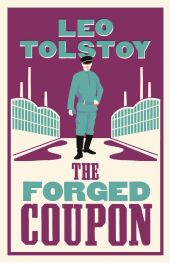 Neuerscheinungen 2018Stand: 2020-02-01 |
Schnellsuche
ISBN/Stichwort/Autor
|
Herderstraße 10
10625 Berlin
Tel.: 030 315 714 16
Fax 030 315 714 14
info@buchspektrum.de |

Leo N. Tolstoi
The Forged Coupon
2018. 160 p. 198 x 129 mm
Verlag/Jahr: BLOOMSBURY TRADE; ALMA CLASSICS 2018
ISBN: 1-84749-667-9 (1847496679)
Neue ISBN: 978-1-84749-667-6 (9781847496676)
Preis und Lieferzeit: Bitte klicken
In order to repay a small debt, the young student Mitya is persuaded by a friend to falsify a bank bond and cash it in. Little does he suspect that this small misdemeanour will have a profound impact on the lives of many other People around him indirectly even leading to the gravest of crimes. This in turn sets off a long journey towards redemption and rehabilitation.Published only in 1911, after Tolstoys death, The Forged Coupon examines the deep, unpredictable consequences of every human act, revealing the Russian masters moral preoccupations in the last years of his life, as well as his rejection of Christianitys simplistic division between good and evil.
Leo N. Tolstoi, geb. am 9.9.1828 in Jasnaja Poljana bei Tula, gest. am 20.11.1910 in Astapowo, heute zur Oblast Lipezk, entstammte einem russischen Adelsgeschlecht. Als er mit neun Jahren Vollwaise wurde, übernahm die Schwester seines Vaters die Vormundschaft. An der Universität Kasan begann er 1844 das Studium orientalischer Sprachen. Nach einem Wechsel zur juristischen Fakultät brach er das Studium 1847 ab, um zu versuchen, die Lage der 350 geerbten Leibeigenen im Stammgut der Familie in Jasnaja Poljana mit Landreformen zu verbessern. Er erlebte von 1851 an in der zaristischen Armee die Kämpfe im Kaukasus und nach Ausbruch des Krimkriegs 1854 den Stellungskrieg in der belagerten Festung Sewastopol. Die Berichte aus diesem Krieg (1855 Sewastopoler Erzählungen) machten ihn als Schriftsteller früh bekannt. Er bereiste aus pädagogischem Interesse 1857 und 1860/61 westeuropäische Länder und traf dort auf Künstler und Pädagogen. Nach der Rückkehr verstärkte er die reformpädagogischen
Bestrebungen und richtete Dorfschulen nach dem Vorbild Rousseaus ein. Seit 1855 lebte er abwechselnd auf dem Gut Jasnaja Poljana, in Moskau, und in Sankt Petersburg. Im Jahre 1862 heiratete er die 18-jährige deutschstämmige Sofja Andrejewna Behrs, mit der er insgesamt 13 Kinder hatte. In den folgenden Jahren seiner Ehe schrieb er die monumentalen Romane Krieg und Frieden sowie Anna Karenina, die Tolstojs literarischen Weltruhm begründeten. Tolstois lebenslange Suche nach der geeigneten Lebensform kulminierte 1910 darin, daß er seine Frau verließ, da diese nicht bereit war, sich von den gemeinsamen Besitztümern zu trennen. Er starb kurze Zeit darauf an einer Lungenentzündung.
Count Leo Tolstoy was born in 1828 at Yasnaya Polyana, in the Tula province, and educated privately. He studied Oriental languages and law at the University of Kazan, then led a life of pleasure until 1851 when he joined an artillery regiment in the Caucasus. He took part in the Crimean War and after the defence of Sebastopol he wrote The Sebastopol Sketches (1855-6), which established his reputation. After a period in St Petersburg and abroad, where he studied educational methods for use in his school for peasant children in Yasnaya Polyana, he married Sofya Andreyevna Behrs in 1862. The next fifteen years was a period of great happiness; they had thirteen children, and Tolstoy managed his vast estates in the Volga Steppes, continued his educational projects, cared for his peasants and wrote War and Peace (1869) and Anna Karenina (1877). A Confession (1879-82) marked a spiritual crisis in his life; he became an extreme moralist and in a series of pamphlets after 1880 expressed his rejection of state and church, indictment of the weaknesses of the flesh and denunciation of private property. His teaching earned him numerous followers at home and abroad, but also much opposition, and in 1901 he was excommuincated by the Russian Holy Synod. He died in 1910, in the course of a dramamtic flight from home, at the small railway station of Astapovo.


